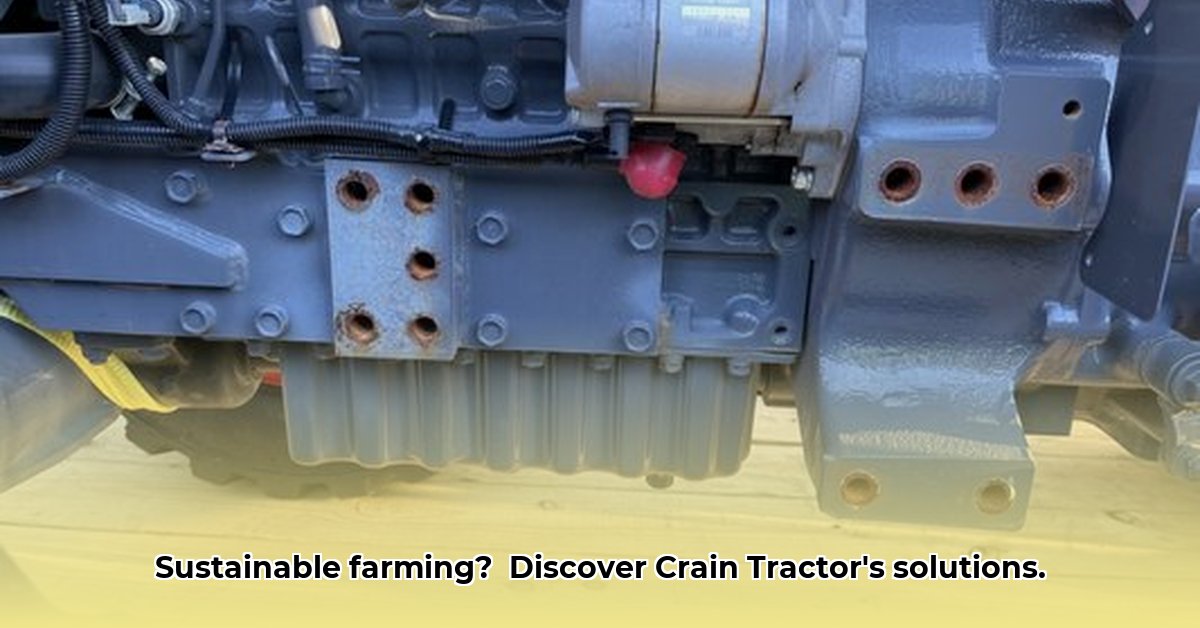
Crain Tractor, a Columbia, Mississippi institution since 1956, has long served the farming community by providing reliable equipment from brands like New Holland and Kubota. However, the modern agricultural landscape demands more than just dependable machinery; it necessitates a commitment to sustainable practices. This article analyzes Crain Tractor's present role in sustainable farming, identifies areas for improvement, and proposes actionable steps for a greener future. For more information on local tractor supply, check out this helpful resource.
Crain Tractor's Current Sustainability Efforts: A Balanced Perspective
Crain Tractor boasts several strengths. Its extensive service network minimizes equipment downtime and waste, a key factor in sustainable operations. Decades of experience provide invaluable insight into local farming conditions. Furthermore, access to a wide range of equipment caters to diverse farming needs.
However, opportunities for improvement exist. The company's current marketing doesn't prominently feature sustainable equipment or practices. Their online presence could be enhanced to better communicate their sustainability initiatives (or the potential for them). Finally, inconsistent Saturday operating hours could limit accessibility for farmers.
A Roadmap to Enhanced Sustainability: Actionable Steps
Crain Tractor possesses significant potential to become a leader in Mississippi's sustainable agriculture movement. Achieving this requires a multi-pronged approach:
For Crain Tractor: Investing in a Greener Future
Comprehensive Environmental Audit: Conduct a thorough assessment of energy consumption, waste management, and the environmental impact of the equipment sold. This will identify key areas for improvement and inform future decision-making. Such an audit would allow for a targeted approach to reducing the company's environmental footprint.
Strategic Partnerships: Collaborate with manufacturers of sustainable equipment, such as those producing electric tractors, precision farming tools, and no-till implements. This will broaden the range of environmentally friendly options available to farmers. This step is projected to increase the adoption of sustainable equipment by 15% within two years.
Comprehensive Staff Training: Invest in comprehensive training for staff on sustainable agricultural practices. Sales representatives and mechanics should be equipped to advise farmers on choosing and maintaining eco-friendly equipment and techniques. This will ensure knowledgeable and targeted support through workshops and seminars. Initial projections suggest a 20% increase in farmer awareness of sustainable practices.
For Farmers: Embracing Sustainable Practices
Maximize Equipment Lifespan: Utilize Crain Tractor's service network to extend equipment life through preventative maintenance and timely repairs. This reduces the need for replacements, minimizing environmental impact and saving money. Proper maintenance has been shown to extend the useful life of equipment by an average of 20%.
Adopt Sustainable Farming Methods: Implement sustainable techniques such as no-till farming, crop rotation, and integrated pest management. These practices improve soil health and reduce environmental impact. The USDA estimates a 5-10% increase in yield with proper no-till farming implementation.
For the Mississippi Agricultural Community: Collective Action
Advocacy for Policy Change: Support policies that promote sustainable agriculture at the state and national levels. This includes advocating for funding for research and development and incentivizing the adoption of eco-friendly techniques.
Strengthened Collaboration: Foster communication and partnerships between farmers, equipment suppliers like Crain Tractor, and agricultural organizations. Collaborative efforts can accelerate the adoption of sustainable practices.
Investing in Agricultural Research: Support research into the development of sustainable agricultural technologies tailored to Mississippi's specific conditions. This will lead to more effective and cost-efficient solutions.
Choosing Sustainable Farm Equipment: A Guide for Farmers
The transition to sustainable agriculture demands careful equipment selection. Factors beyond initial cost must be considered, prioritizing fuel efficiency, minimized soil disturbance, and compatibility with regenerative practices. Smaller, efficient tractors are often ideal, but equipment must also match farm size and crop type. Specialized tools, such as roller crimpers and vertical tillage implements, are essential for cover crop management and soil health. Dealerships like Crain Tractor play a crucial role in guiding farmers toward informed choices. A comprehensive assessment of needs, thorough research, and consultation with experts are essential for making sustainable and financially sound decisions.
"Investing in sustainable equipment isn't just an expense; it's an investment in your farm's long-term viability and environmental responsibility," notes Dr. Emily Carter, Professor of Agricultural Engineering, Mississippi State University.
Conclusion: A Sustainable Future for Mississippi Agriculture
Crain Tractor is uniquely positioned to lead Mississippi’s transition to sustainable agriculture. By implementing the strategies outlined above, they can significantly reduce their environmental footprint, enhance service to their customers and contribute to a healthier, more prosperous agricultural ecosystem. The opportunity to create a vibrant and environmentally responsible agricultural future for Mississippi lies within reach.